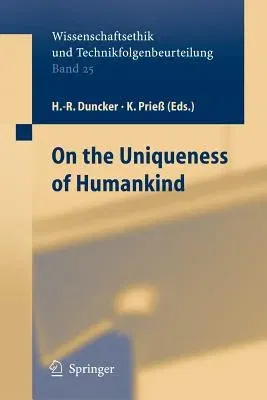On the Uniqueness of Humankind (2005)Paperback - 2005, 23 November 2014

Qty
1
Turbo
Ships in 2 - 3 days
In Stock
Free Delivery
Cash on Delivery
15 Days
Free Returns
Secure Checkout
Part of Series
Ethics of Science and Technology Assessment
Print Length
124 pages
Language
English
Publisher
Springer
Date Published
23 Nov 2014
ISBN-10
364242144X
ISBN-13
9783642421440
Description
Product Details
Book Edition:
2005
Book Format:
Paperback
Country of Origin:
NL
Date Published:
23 November 2014
Dimensions:
23.39 x
15.6 x
0.79 cm
ISBN-10:
364242144X
ISBN-13:
9783642421440
Language:
English
Location:
Berlin, Heidelberg
Pages:
124
Publisher:
Weight:
213.19 gm

